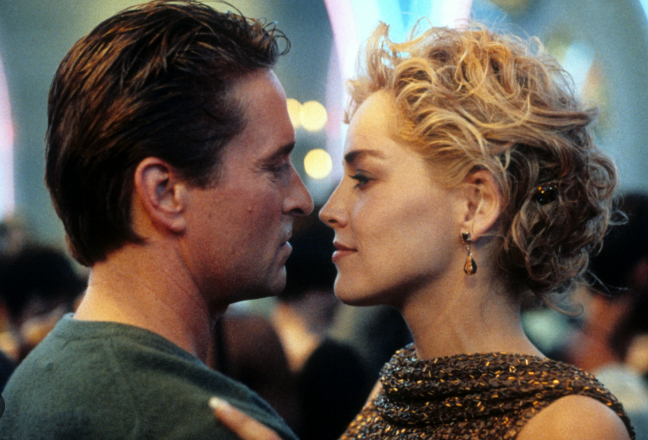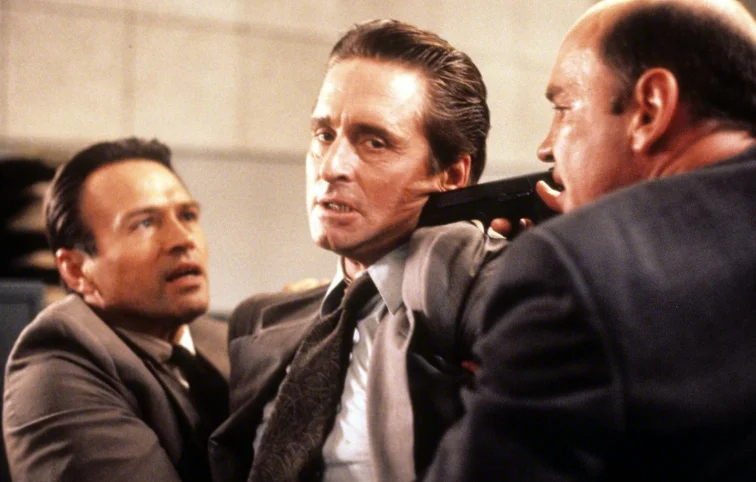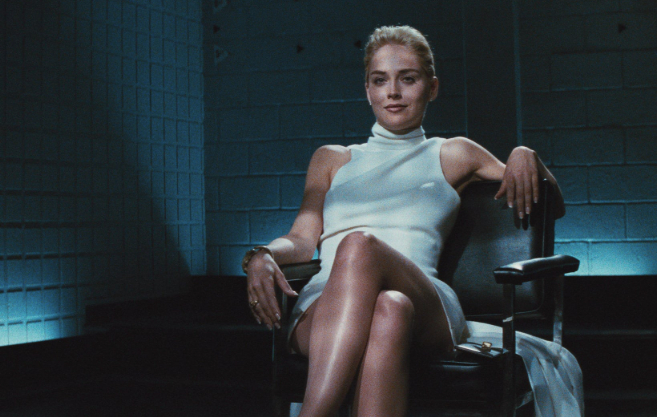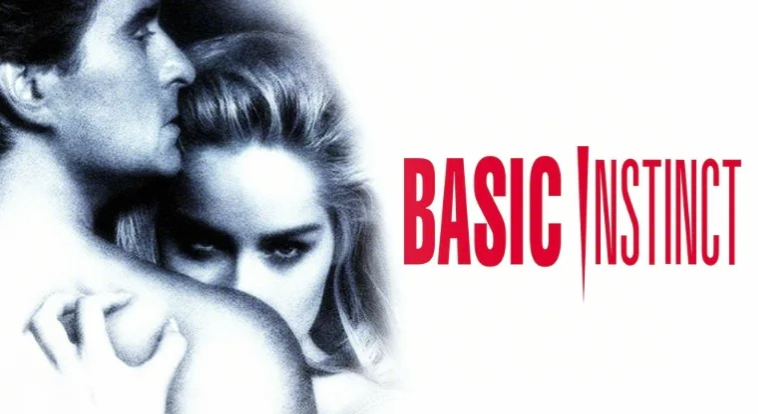Basic Instinct (1992)
When Basic Instinct hit theaters in 1992, it didn’t just ignite controversy — it ignited a cultural phenomenon. Directed by Paul Verhoeven and written by Joe Eszterhas, the film broke taboos, rewrote the rules of the erotic thriller, and propelled Sharon Stone into global stardom. A heady mix of psychological manipulation, explicit sexuality, and noir-style suspense, Basic Instinct remains one of the most provocative mainstream films of its era — and one that continues to divide, fascinate, and inspire three decades later.
🧠 Plot: Murder, Sex, and Smoke-Filled Interrogations
The story begins with a brutal, stylized murder: a rock star is found stabbed to death during sex with an ice pick. Enter Detective Nick Curran (Michael Douglas), a cop with a past as murky as the case he’s now investigating. His prime suspect? Catherine Tramell (Sharon Stone) — a glamorous, brilliant crime novelist who was not only the victim’s lover, but also wrote a book in which a nearly identical murder took place.
From their first meeting, Catherine seizes control. She’s calm, clever, and fearless — toying with the police, playing mind games with Nick, and using her sexuality as both shield and sword. As Nick is drawn deeper into her web, his obsession with Catherine threatens to unravel his sanity, his career, and possibly his life.

Is she a cold-blooded killer? Or merely a dangerously smart woman in a world that expects her to play by the rules?
🎭 Performances: Femme Fatale Redefined
Sharon Stone, in the role that defined her career, delivers a performance of magnetic control. Her Catherine is a masterclass in ambiguity — seductive, intellectual, and terrifyingly self-aware. The now-infamous interrogation scene isn’t just provocative — it’s iconic. Not because of its shock value, but because Stone turns an exploitative male gaze into a power move. Her performance transcends the moment and reclaims the frame.
Michael Douglas, already a veteran of morally gray roles, brings an edge of instability to Nick Curran. He’s not the hero. He’s not the villain. He’s the flawed man standing in the shadow of a woman who outmatches him intellectually and emotionally — and knows it.
Supporting performances from Jeanne Tripplehorn (as Nick’s psychologist and former lover) and George Dzundza (as his loyal partner) add layers to the narrative, grounding the psychological chess match with human emotion and skepticism.
🎬 Direction & Style: Verhoeven’s Slick, Subversive Eye
Paul Verhoeven directs with European boldness and Hollywood polish. Every frame of Basic Instinct is stylized to provoke — not just sexually, but thematically. Mirrors, ice, cigarettes, slow zooms, and chiaroscuro lighting all contribute to an atmosphere thick with suggestion.
The film borrows heavily from film noir traditions — femme fatales, unreliable narrators, moral ambiguity — but pushes them into hyper-modern territory. It dares to blur the line between manipulation and desire, between predator and prey.
Jerry Goldsmith’s score is a haunting, pulsing piece of work — subtle at first, then swelling with dread and sensuality, tracking Nick’s descent into obsession.

🧩 Themes: Power, Gender, and the Weaponization of Desire
Beneath its sleek eroticism, Basic Instinct is a film about power. Not just physical power, but psychological dominance. Catherine Tramell isn’t a victim or a seductress in the traditional sense. She’s a disruptor of male authority, and that’s what makes her so dangerous to the men around her — and to the culture that made the film both a hit and a scandal.
The film explores how sex, intellect, and storytelling intersect with violence and control. It never gives the audience full clarity — on purpose. It wants you to question everyone. To distrust desire. To see how much we’re willing to overlook when we’re infatuated — and what that says about us.
❗ Controversy and Legacy
Basic Instinct was a lightning rod upon release. LGBTQ+ groups protested its portrayal of bisexuality and queer-coded villainy. Feminist critics debated whether it was empowering or exploitative. The MPAA initially gave it an NC-17 rating before cuts were made.

But controversy didn’t hurt the film — it fueled it. It became a box office hit and a cultural touchstone. And over time, critical reevaluation has brought new appreciation for its layered gender politics, subversive narrative, and genre-defining boldness.
It’s not a film that plays it safe. It’s a film that dares you to look — and then challenges what you think you saw.
🕯️ Conclusion: A Thriller That Still Cuts Deep
More than 30 years later, Basic Instinct endures not just as a provocative erotic thriller, but as a fascinating time capsule of cultural tension — and as a story that remains dangerous, seductive, and utterly unforgettable.
Whether you view it as exploitative, empowering, or both at once, there’s no denying its place in cinema history. Catherine Tramell didn’t just leave her mark on Nick Curran. She left it on all of us.

⭐ Final Verdict: ★★★★☆ (9/10)
A fearless, unforgettable descent into obsession, power, and pleasure — and the story that dared to make the femme fatale the smartest person in the room.
Directed by: Paul Verhoeven
Written by: Joe Eszterhas
Starring: Sharon Stone, Michael Douglas, Jeanne Tripplehorn
Genre: Erotic Thriller / Neo-Noir
Release Date: March 20, 1992
Rating: R
#BasicInstinct #SharonStone #MichaelDouglas #EroticThriller #PaulVerhoeven #IconicCinema #90sFilm #FemmeFatale #FilmNoirReborn #CatherineTramell
